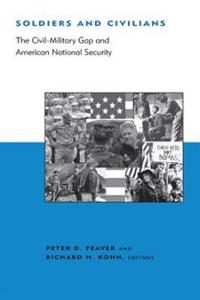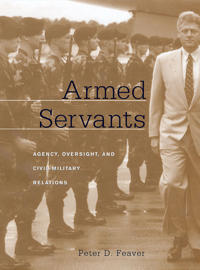Soldiers and Civilians (Häftad)
avPeter D. Feaver, , Bcsia Studies in International Security
ISBN: 9780262561426 - UTGIVEN: 200110Soldiers and Civilians analyzes the emerging civil-military "gap" in the United States, drawing on a major survey of military officers, civilian leaders, and the general public. The book's contributors, leading scholars of defense policy, find that numerous schisms have undermined civil-military coo[...]
Armed Servants (Häftad)
avPeter D. Feaver
ISBN: 9780674017610 - UTGIVEN: 200503How do civilians control the military? In the wake of September 11, the renewed presence of national security in everyday life has made this question all the more pressing. In this book, Peter Feaver proposes an ambitious new theory that treats civil-military relations as a principal-agent relations[...]
Choosing Your Battles: American Civil-Military Relations and the Use of Force (Övrig)
avPeter D. Feaver, Christopher Gelpi
ISBN: 9780691124278 - UTGIVEN: 2005-08-22America's debate over whether and how to invade Iraq clustered into civilian versus military camps. Top military officials appeared reluctant to use force, the most hawkish voices in government were civilians who had not served in uniform, and everyone was worried that the American public would not [...]
Paying the Human Costs of War: American Public Opinion and Casualties in Military Conflicts (Övrig)
avChristopher Gelpi, Peter D. Feaver, Jason Reifler
ISBN: 9780691139081 - UTGIVEN: 2009-02-09From the Korean War to the current conflict in Iraq, Paying the Human Costs of War examines the ways in which the American public decides whether to support the use of military force. Contrary to the conventional view, the authors demonstrate that the public does not respond reflexively and solely t[...]






